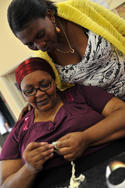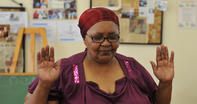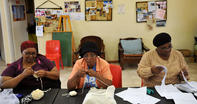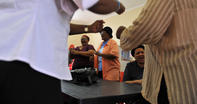Returning to School

Although I was a mother of two children I was back at school, attending adult classes at night, to pass my Standard Ten, the last year of high school. I had returned for my children's sake. Vusi and Thumela, the eldest of my four children, had been refusing to go to school.
'I want to get a job, like dad,' Vusi had been saying. 'Me too,' said Thumela. 'What's the point of school? I'm an adult now and it's time to earn money.' 'Absolutely not,' I told them. 'You're going back. Education is the key to your future. You must follow in my footsteps and get a good qualification.' They were not convinced, so I decided to set an example.
Goldie the Scholar

I had a teacher's qualification, but I had not finished school, because when I was young we could go to teachers' training college after only a few years of high school. Now, as a mother, I decided to go back to high school. I knew that my children would follow, for fear of being outdone by their mother.
The villagers of Oamata had been saying there should be a night school for adults and the chief had given his permission. So a group of us went to see the principal, asking to be the first to enroll in the night school. He wrote our names down as the first students. Next thing, I was studying with my children. Some young people who had not finished school were also at night school.
When they saw me coming to class in the evenings, they said, 'Oh shame, look at this poor old lady. She's going to do very badly because she is from olden days. All she does all day is to make stamped mielies outside the house. She's going to write very slowly, that grandmother.' I told them off. 'Don't pass remarks about me.
We're all in the same class now and I'm here to stay. You'll see me tomorrow, and next week, and next month, still coming to school, so you had better get used to it.'
Creating Competition

I went to classes every night, after they got home from their own classes. All my children, the boys as well as the girls, helped me with the housework so that I could study. I had brought them up very strictly, like my parents had brought me up, and they knew they had to make food, wash clothes, iron and clean the yard.
I had the same teachers as Vusi and Thumela and we competed to see who would get the best marks. If the teacher gave us a composition, we wrote it together at home and when we got it back two days later, after it had been corrected, we would look at each other's papers to see who got the best marks. It was usually me.
They said, 'No, no, mom was educated in the olden days. We can't let her beat us.' I taught them the value of school and, in the end, they all passed. The first composition we wrote together was 'Who are you?' I wrote about the important things that had happened in my life and the things I liked about myself.
The second composition was called 'Happiness', and the third was 'Describe the forest and the fields.' I got 60 per cent for these compositions and my children got 39 or 40 per cent. I did better than my children in all my essays.
Flawed System

When we wrote our final exams, I got an A for English. But the principal told me, 'The circular from the education department said you must write again.’ 'How on earth could I copy a composition?' I said, very upset. 'How does the education department think I can copy a letter?' I like English and I'm always learning it.
Even now, as a grandmother, got a book on the English language and I use an English-Xhosa dictionary, learning from it how to translate one word into another. A few months later I wrote the exam again and this time I passed with an E. It was very bad luck.
One of the teachers explained to me that some of the examiners were drunk when they marked the final exams and they would say things like, 'I know that person and he's clever. I'll give him a good mark', and when they got to the next paper they would say, 'I don't know who this one is. I think I'll take down the mark a bit.'
By Jo-Anne Smetherham